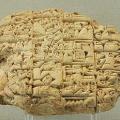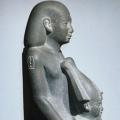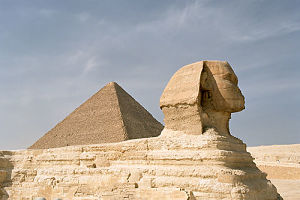4. Pyramid Schemes: Philosophy in Ancient Egypt
Ancient Egyptian figures and writings including the Pyramid Texts, Imhotep, and the "first monotheist" Akhenaten reflect on the nature of things and questions of morality.
Themes:
• J.P. Allen, The Ancient Egyptian Pyramid Texts (Atlanta: 2005).
• M.K. Asante, The Egyptian Philosophers: Ancient African Voices from Imhotep to Akhenaten (Chicago: 2000).
• J. Assmann, The Price of Monotheism (Stanford: 2009).
• A. Dodson, Amarna Sunset: Nefertiti, Tutankhamun, Ay, Horemheb, and the Egyptian Counter-Reformation (Cairo: 2009).
• A. Dodson, Amarna Sunrise: Egypt from Golden Age to Age of Heresy (Cairo: 2014).
• O. Goelet, R. Faulkner, The Egyptian Book of the Dead: The Book of Going Forth by Day (San Francisco: 1998).
• J.K. Hoffmeier, Akhenaten and the Origins of Monotheism (New York: 2015).
• E. Hornung, Akhenaten and the Religion of Light (Ithaca: 1999)
• M. Karenga, Maat: The Moral Ideal in Ancient Egypt: a Study in Classical African Ethics (New York: 2004).
• M. Lichtheim, Ancient Egyptian Literature, Vols. 1-3 (Berkeley: 1973-1980).
• S.B. Morrow, The Dawning Moon of the Mind: Unlocking the Pyramid Texts (New York: 2015).
• T. Obenga, African Philosophy: The Pharaonic Period, 2780-330 BC (Popenguine: 2004).
• W.K. Simpson, The Literature of Ancient Egypt (New Haven: 2003).
In Our Time: Akhenaten, The Egyptian Book of the Dead
Peter Flegel in Philosophy Now on the influence of Egyptian philosophy







Comments
First philosopher in eternity
How did Aristotle and his followers reconcile their belief in the eternity of the universe with their belief in the existence of various historical "firsts", e.g. that Thales was the first philosopher or that science was first performed in Egypt?
In reply to First philosopher in eternity by Eternalizer
Firsts
Good question. I guess the answer is that the commitment to eternity only concerns natural species, not things like practices - so though there have always been humans they haven't necessarily always done mathematics.
Thank you, Philosophy in ancient Egypt--podcast 1
Dr. Adamson,
Thank you for your podcast on philosophical foundations in ancient Egypt. I look forward to the podcast on the Instructions genre of Egyptian wisdom literature, some of which I read in hieroglyphs and hieratic at The University of Chicago in the 1980s while working on a philological doctoral thesis there.
For whatever it may be worth, the following is a note on Egyptian ontology and the concept of non-existence before creation: Erik Hornung, the emeritus professor of Egyptology at Basel University, has been recognized for years as one of the leading scholars of Egyptian theology and religious history. In his book, Conceptions of God, 1982, pp. 173-174 et al. (tr. from Die Eine und die Vielen, 1971), Hornung describes how Egyptian creation myths (representing Egyptian theology) define the non-existent, or the state of non-existence, that preceded the creator gods, particularly the sun-god, creating themselves, after which and from which all other creation came forth. This comprises a pillar of ancient Egyptian ontology that can be traced through the theology of ancient Egyptian religious texts and wisdom/instruction texts.
The Further Reading bibliography looks good from an Egyptological perspective, and it is good that you included Hoffmeier's recent research, which is one of the best current scholarly descriptions that I can find on the henotheism > monotheism development in Akhenaten's theological reflection about, and worship of, the sun-god Aten, a development that occurred very quickly--in less than a decade (!) during Akhenaten's reign (Hoffmeier, Akhenaten, pp. 136-137).
Also it may be worth considering adding to your bibliography Before Philosophy: the Intellectual Adventure of Ancient Man (Chicago, 1946; retitled and revised in 1977, The Intellectual Adventure of Ancient Man: an Essay on Speculative Thought in the Ancient Near East) by Frankfort, Frankfort, Wilson, Jacobsen, and Irwin/Pardee. Though the book is over 50 years old, it seems to still be considered a useful overview of philosophical reflection in Mesopotamian (Jacobsen), Egyptian (Wilson), and ancient Israelite (Irwin/Pardee) literatures, and it may yield some further insights for the podcasts and the books that you are working on.
Thank you again.
Best regards,
Dr. Gary S. Greig
Ancient Egypt
what makes Imhotep a scientist ? I don’t think it’s accurate to label him a scientist .
In reply to Ancient Egypt by Fabbeyond jefe
Imhotep
Well, he was a mathematician and engineer apparently, so that seems close enough to me.
The "First Philosopher"
I was browsing through old volumes of The Monist (as one is wont to do) and came across this article from 1902, proclaiming to have discovered "the oldest known philosophical explanation of the world, written a thousand years before the first Greek philosopher was born". I thought you might find it interesting.
https://www.jstor.org/stable/27899325?seq=1#metadata_info_tab_contents
In reply to The "First Philosopher" by David Taylor
Ye olde Monist
Wow, that is astounding! The first sentence also plunges one quickly into an earlier world of scholarship, doesn't it?
Thanks for sharing this discovery!
In reply to Ye olde Monist by Peter Adamson
Yes, a fascinating article
Yes, a fascinating article (it helps that it's open access!) and a perfect demonstration of why the 'mythology =/= philosophy' distinction argued for by a few earlier in this series doesn't stack up - much like the 'religion =/= philosophy' distinction in the medieval series.
I also think it is another strike in favour of taking seriously philosophy in non- or pre-literate societies. I have only a very shallow knowledge of Polynesian creation myths, metaphysical concepts, and ethical systems, for example, but from reading Breasted's article it seems like the only real difference between these and the mytho-philosophy he analysis in the hymn of Ptah on the Shabaka stone is that the latter is written down - which isn't a terribly satisfying criterion for something to be called philosophy, especially now that so much indigenous oral culture has been recorded in one way or another. Overly broad? Perhaps, but better than dismissing interesting ideas and developing a fuller understanding of the history of human thought for reasons that, when you get right down to it, look uncomfortably ethnocentric.
Aten -> Athena?; Negative confession -> Ten Commandments
This segment made me wonder: could "Aten" be the etymological source of "Athena"? Athena the name predates even Archaic Greece, going back to the Minoans from what I gather. The Minoans were known to trade with the Egyptians in the Late Bronze Age, before the multi-civilizational system of the Near East collapsed in the 12th century BC. Note the similarity between the sun-disc-with-rays and the Gorgoneion.
Another similarity which cannot be missed is between the Negative Confessions and the Ten Commandments, given to the Israelites en route from Egypt....
But I must say: even if many roads of wisdom lead back to Egypt, it would be wrong to say "aha, Egypt is where it all began". Braudel's Memory and the Mediterranean inspired me to begin seeing this sea and the lands surrounding it as a web of interconnected theatres where ideas find their way around and human civilizations play themselves out, defined as it were by their specific geographies and topographies. The Nile is a long vein into Central East Africa, and when you consider that thousands of years ago there was a humid period in the Sahara, can we rule out connections the Central West? Of course Mesopotamia links the Mediterranean to Asia and somehow, ideas travel.
So I guess the question "how did ideas travel in ancient times?" is a more important one than "where did ideas originate?" - because the answer to the former could potentially upend any answer one may tentatively find or believe to already know regarding the latter.
Add new comment